America is a nation of immigrants? Not precisely.
BY JULIE SCHUMACHER COHEN | December 2, 2020
“America is a nation of immigrants.” The statement has become ubiquitous. It is often used to beat back perspectives espoused by white supremacists who want a country that is exclusively or predominantly white—a mythical distortion of our actual history. But in positively supporting immigrant and refugee populations as the U.S. has increasingly closed its doors, the phrase can also prompt a problematic erasure of the full story of America, and fails to make common cause among cries for justice for immigrants, Indigenous peoples, and Black Americans.
I witnessed these problems while attending a recent national conference. University and police leaders were discussing an attempt by federal law enforcement—Immigration and Customs Enforcement (ICE), in particular—to conduct operations in a community which includes a growing number of immigrants from Latin American countries. The incident had prompted cooperation by the two institutions to reject using immigration status as a basis for local action and to maintain the community trust necessary for effective policing. In reporting on their work together, one presenter shared that oft-repeated refrain—“We are a nation of immigrants”—and then took the initial comment even further, saying: “there are no Natives here.”
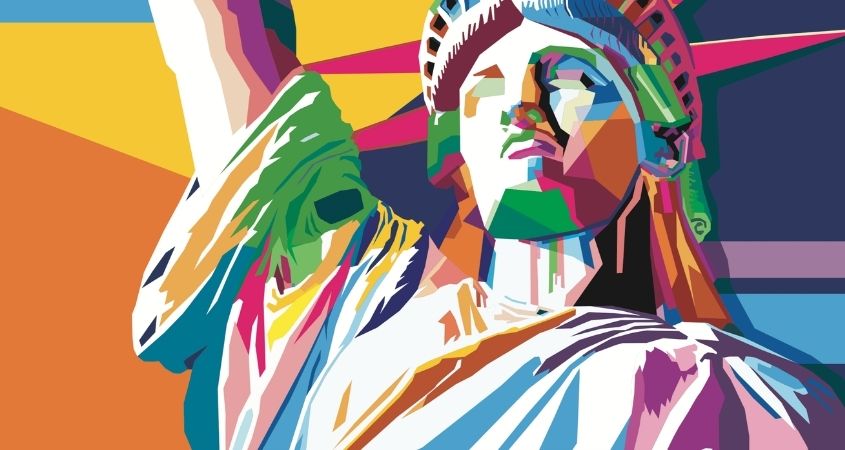
The words hung in the air; a colleague who is a member of Sagkeeng First Nation and who was sitting nearby later told me it was the kind of wrong-headed sentiment she’s sadly accustomed to. Of course, she is “Native” here in this country, in what were once her ancestral lands. In trying to rebuff anti-immigrant sentiments, the speaker had in the meantime elided American history altogether, in ways I have lazily echoed myself, failing to recognize that “we” are actually not all immigrants. Not only does the term immigrant not apply to First Nations or Native Americans, but of course also not to African Americans—as a Black colleague would also reflect later that same day. Her ancestors did not “immigrate” here, either. White colonists, and later Presidents and citizens of the new United States, kidnapped Black Africans to bring them here and traffic them as slaves to be sold and subjugated.
The often idealized American immigrant story that involves invoking the elusive “American dream” typically leaves out Black and Indigenous experiences in ways that fail to build bridges amid and across different experiences of marginalization. Here in Scranton, the organization Black Scranton Project began as an outgrowth of founder Glynis Johns’ Masters thesis, “But You’re Black: The Overlooked Community of Scranton, Pennsylvania.” Scranton’s rust-belt history involving significant European immigration during the coal-mining era—including many Irish and Italian Catholics who would face their own ethnic and class prejudices—has often overlooked the longstanding African-American migration to the area via the underground railroad’s outpost in nearby Waverly, PA.
In fact, Black Americans and Indigenous peoples have their own distinct stories of movement and upheaval—such as the Great Migration of African Americans northward to escape the Jim Crow South and the Trail of Tears of the Cherokee people westward which represents just one example of a long history of coercion and widespread removal of Indigenous peoples. These are not the stories generally told when we speak about migration experiences today. The centrality of the immigrant story, though true for many Americans (my mother is a naturalized citizen from Israel; my father’s family goes back a few generations with Swiss and German roots) and especially urgent given unjust U.S. policies at our Southern Border, must also be re-framed.
As an administrator at our Jesuit university, I have taken seriously along with many colleagues Pope Francis’ call in 2015 to respond to the global refugee crisis. We started a solidarity initiative that included work with local refugees and immigrants from Latin America, Nepal, Syria, and the Democratic Republic of Congo. I help organize Scranton’s annual World Refugee Day. The Jesuit network has also been a strong voice for the DACA program and undocumented students on our campuses. This work is important and ongoing.
In 2020, we have been called to face yet another crisis, one that is longstanding: a racial reckoning that should cause us to search our hearts and our institutional structures, to redouble the work of dismantling racism in our midst. This is happening across our Jesuit network, including at The University of Scranton. It would behoove us to see this work—to welcome immigrants and ensure that Black Lives Matter—as interconnected in an anti-racist approach. Indeed, we can increasingly find ways in which Black and Latino Catholics are finding common cause, including for those who identify as being in both communities, as well as other examples of cross-solidarity.
“Decolonization” can seem like an abstract goal, out of reach or functioning as a kind of intellectual exercise rather than a concrete task, and yet it is a very real process at work when migrants move from places of conflict and poverty that have long legacies of colonial impact—Middle East and African refugees to Europe in particular—or here in the U.S. where the African slave trade was directly related to America’s origin as a set of colonies, even if the first settlers were also fleeing their own experience of religious oppression. As Adam Getachew wrote in a New York Times op-ed entitled, “Colonialism Made the Modern World. Let’s Remake It.,” the tearing down of various statues around the world is forcing a “confrontation with the history of empire,” including the “illusion that empire was somewhere else.” He argues: “acknowledging that colonial history shapes the current inequalities and hierarchies that structure the world sets the stage for the next [step]: reparations and restitution.” Indeed, Christian repentance and forgiveness also involves restitution on the road back to right relationship. As Jesuit Chris Kellerman, S.J., recently wrote for The Jesuit Post, “Catholic theology not only supports but requires that injustices be remedied;” moreover, “injustice being complicated does not mean it no longer needs to be rectified.”
The ways in which so many Americans, recent and longstanding, have had to flee injustice—whether as immigrants and refugees due to distant calamities or as Black or Indigenous persons escaping violent racism that was part of the American Founding—can help us reimagine the story of America in fresh, significantly modified terms. It can set us on a new journey to better support the human flourishing of all. In the wake of George Floyd’s murder, Pope Francis attributed his death to “the sin of racism” and urged Americans: “we cannot tolerate or turn a blind eye to racism and exclusion in any form and yet claim to defend the sacredness of every human life.” There is much work to do.
Julie Schumacher Cohen is assistant vice president for community engagement and government affairs at the University of Scranton, where she focuses on community-based learning, political dialogue, refugee solidarity, and other civic engagement initiatives. Prior to Scranton, she worked for NGOs to advance peace and justice for Israelis and Palestinians. Cohen is a doctoral student in political science at Temple University and an alumna of the Ignatian Colleagues Program.


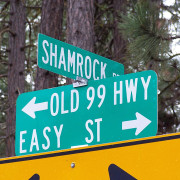
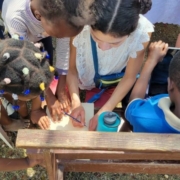

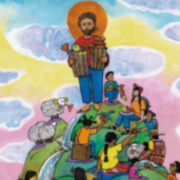
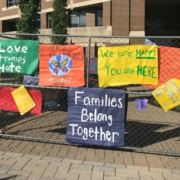
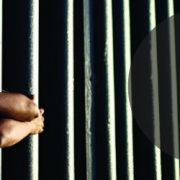

It’s a challenge. Nothing is impossible. Injustices have to be remedied.
Millions of people were subjected to forced migration every race took part and was also affected by it not just Black people, but I understand we are not including those but the people which were already here, which would be just the Natives has there was no other races before that is a theory.
Has for the Italians and Irish they were treated has 3rd class citizens and were also known to be treated the same has Black people, also tell me about the 20 Italians that were dragged from there homes and made a example of in NY and in other states more were subjected to it too.
Europes history is alot worse than ours when we discuss how they treated others even there own race.
We look back in disgust but we weren’t living back then and if you were you would be doing the exact same thing. In our eyes it was wrong but to them it was normal, I wonder what they’ll think about us in the future.
Has for the quote by Pope Francis at the end of the blog regarding excluding and not turning a blind eye to racism. I find this hypocritical and concerning from a Black person perspective because now we are excluding Whites from jobs, education, free speech and other aspects of everyday living and also inflicting white guilt plus also lie about false privilege which is wrong.
We only listen to white people that agree and call others racist when they are the opposite, how are we any different ? There’s plenty of documented video and written proof of this happening.
Only God can be judge and jury not us
Are not the group of people we refer to as Native American immigrants themselves from Central Asia?
Yes they were although there are multiple years ranging from 12,000 to 35,000 years ago, no exact time stamp.
First to colonize this country and should be given more rights and there land back which was stolen from them but hardly anyone speaks up for them. If a certain thing happened tomorrow people would march for justice but not for Native Americans that lost millions just for land and wealth.
Whilst having casinos and suburbs built on old reservations.
The original inhabitants of North America are immigrants. They did not originate here but rather migrated here from Asia for one reason or another. Saying so and accepting this fact in no way diminishes their importance, contributions and original claims on the land. Blacks were forced to immigrate to North America. We are indeed all immigrants!
Each comment here, except for the last reply, is made by a sociopath. And the one that claims to be Black, they aren’t.
We are a nation of EUROPEAN immigrants.
Liberals conveniently leave that word out.
We transplanted EUROPEAN civilization to North America.
What Europe is struggling to do on the European continent has already been accomplished in North America.
Europeans from every country blended together in America and became one.
That is what made America the technological powerhouse it is.
We have all but lost that now.
The author left out the fact that thousands of black people were also forced to walk The Trail Of Tears westward to Oklahoma, as Cherokee Indians owned black slaves as well. Also, you had Seminole Indians, from Florida, who were forced to walk that trail – and there were black Seminole Indians in that group.